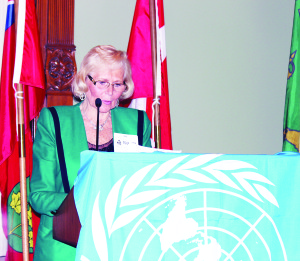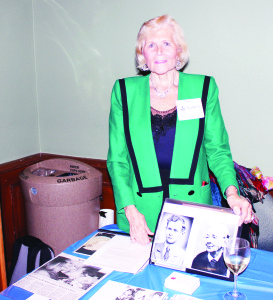|
Caledon Citizen https://caledoncitizen.com/caledon-east-woman-recalls-the-horrors-of-buchenwald/ Export date: Thu Apr 3 20:26:36 2025 / +0000 GMT |
Caledon East woman recalls the horrors of BuchenwaldBy Bill Rea It's hard to imagine having lived through the Holocaust, but a Caledon East woman did, and used it to find a way to “turn my scars into stars.” Baroness Tamara Von Schlegel was one of the speakers last Thursday at United Nations Day celebrations, held at Queen's Park and hosted by United Nations Association in Canada, Toronto Region Branch (UNACTO). Von Schlegel at times was very emotional, as were many in the audience, as she described the roughly two years she spent as a young girl at Buchenwald concentration camp. She said the rise to power of Hitler changed history and her life, even if it was a couple of years before she was born. She added that's been behind much of her motivation. “We need to change and respect our earthly brethren,” she said. Born in what is today part of Ukraine, Von Schlegel recalled the bright, sunny day when she was three, and SS officers announced the family was being transferred to another city because her father and his brother were suspected of being spies. She said they were packed on animal train wagons like sardines, in sweltering heat, not knowing where thy were going. She also remembered being uneasy when they arrived at the camp, passing through enormous gates, by stern-faced armed guards and seeing the high barbed-wire fence. “I started demanding that we go home,” Von Schlegel said, but they were all ordered to sit still in uncomfortable wooden chairs. Her older brother kept asking questions of the officers, while her baby sister was crying. The orders were given for the baby to be silent. “This was the first time I had ever seen my sister not get her way,” Von Schlegel recalled. She said her brother was placed in a larger barber's chair and his head was shaved. At first, Von Schlegel thought he was being punished for asking so many questions. But then it was her turn, over her objections. “I was a good, quiet, obedient girl,” she said, recalling how fond she was of her long blond hair. “I definitely didn't need a haircut.” But a guard held her firmly in the chair while another cut off her hair. She remembered her mother wiping away her own tears with the baby's hair. Everyone else was shaved, one by one. “This was the last image I had of my mother, and the last time I saw her,” she said. Everyone was then marched into another room and stripped, and then herded into ice-cold showers. “The only security I could find was in my father's arms,” Von Schlegel said, recalling how she clung to him with all her might, pressing her face into his chest and screaming. After the shower, they were all dressed in blue-and-white striped pyjamas, and the children were loaded on trucks normally used to ship animals and taken to Buchenwald. They were guarded by brutal strangers and their pushing, yelling and kicking. “I kept hoping that this might be a bad dream, and that I would soon wake up,” she said. Von Schlegel stressed that her childhood memories don't include laughing, being silly or clutching toys. Her only possession at the time was an instrument of survival — an aluminum food can with a wire handler. The symbolism of the can taught her some important lessons. One of the first days, she kept fidgeting and jumping in and out of line. The result was she missed her turn and got no food that day. She learned to stay in line from then on. She added she learned how to manipulate the can, making sure she didn't spill a drop of food. Von Schlegel recalled receiving some extra bread from an elderly couple. She wasn't sure how they were able to do that, or even communicate with each other, since men and women were housed in different barracks. She added the bread stopped coming when the couple was transported to Auschwitz. “We children knew that sound, ‘Auschwitz,” Von Schlegel said, “however, not the horror it represented.” Children were transported daily on cattle trucks to work, where they were beaten by kapos (prisoners assigned to watch other prisoners). “Some of the kapos were okay,” Von Schlegel remembered. “Others were very cruel.” Although she was so young, Von Schlegel remembered mothering and comforting other children. She added that's one reason why she got into the early childhood education field. In the winter of 1944, Von Schlegel developed an ear, nose and throat infection. It went untreated, and eventually got into her blood, immobilizing her. She feared she would wind up in a mass grave with bodies (some still living) of people who were too sick or weak to work. She recalled a day when they were lined up. A tall, skinny man was gently stroking her head. He suddenly fainted right in front of her. A guard ordered him to get up, and receiving no response, he turned the man on is back and kicked him. A shot was fired and Von Schlegel said “I could feel warm blood oozing over my feet.” She thought the same thing was about to happen to her, but it didn't. She then ran away, almost falling in a mass gave. Von Schlegel said she hid herself in a pile of civilian clothes, and found reassurance and comfort in these ordinary articles. She fell asleep. After 19 months at Buchenwald, Von Schlegel said she was freed by Americans. She left the camp on a stretcher carried by two German officers. “Why do we have to take this cadaver?” she heard one say to the other. “This one has no chance of surviving.” Von Schlegel thought she was close to death, not being able to move. But her brain and imagination were active and busy. She was placed in an American military hospital, where she remembered that everyone made quite a fuss over her. “I felt secure and treasured,” she said, recalling the day when she was finally able to move her big toe. “I had been restored to life.” After being released from hospital, Von Schlegel lived in the loving care of a Polish woman until her father and grandmother were found. Between 1945 and ‘49, she was moved to various foster care homes as her father was in hospital, occasionally spending time with her grandmother, who was almost blind from experiments she had been subjected to in the camps. She had to obtain food for them, sometimes climbing over a fence at a military base to collect food from the piles of garbage. She also said her grandmother sometimes observed how lucky they were that they hadn't been sent to Auschwitz. The ordeal wasn't completely over either. Von Schlegel said she still had to deal with hate from other children, and taunts of the “dirty Jew” variety. Von Schlegel's father died in 1949, knowing the end was near for him. But they were able to spend time together, as he started teaching her to swim and ride a bike. “His love made me achieve my ultimate,” she said. “Facing a fate I could not change, I did rise above myself,” Von Schlegel told the audience. She said she had great business success, but also had to deal with serious reversals and bankruptcy. “This too has passed.  Holocaust survivor and Caledon East resident Baroness Tamara Von Schlegel spoke at a United Nations Day celebration at Queen's Park last Thursday. 
|
|
Post date: 2013-10-31 11:10:12 Post date GMT: 2013-10-31 15:10:12 Post modified date: 2013-10-31 11:10:12 Post modified date GMT: 2013-10-31 15:10:12 |
|
Export date: Thu Apr 3 20:26:36 2025 / +0000 GMT This page was exported from Caledon Citizen [ https://caledoncitizen.com ] Export of Post and Page has been powered by [ Universal Post Manager ] plugin from www.ProfProjects.com |